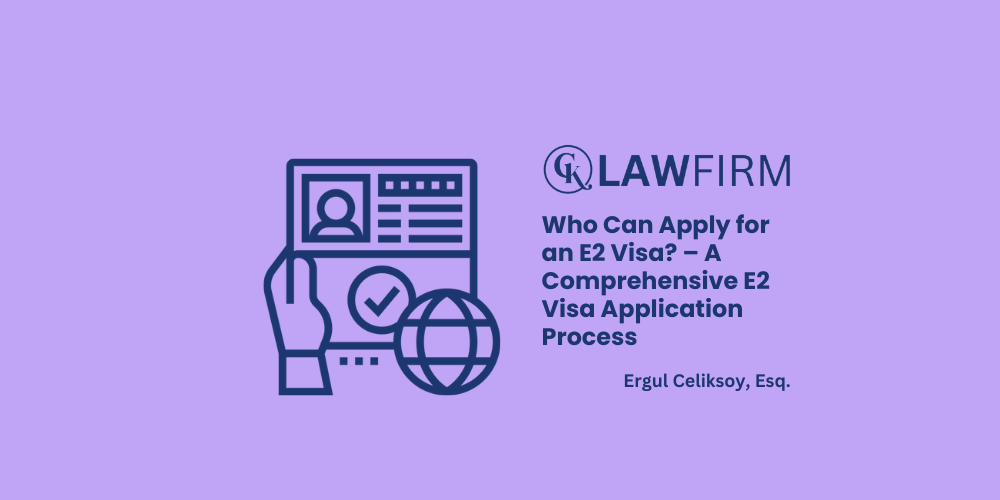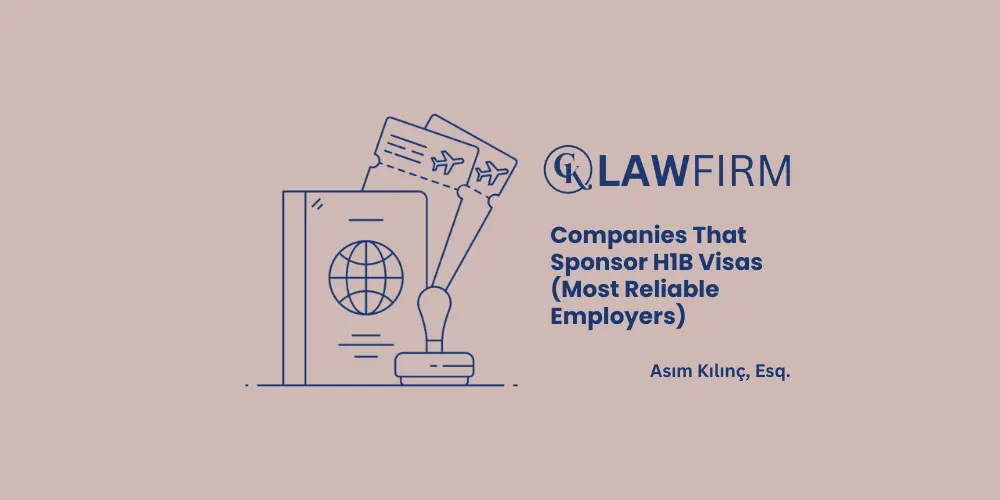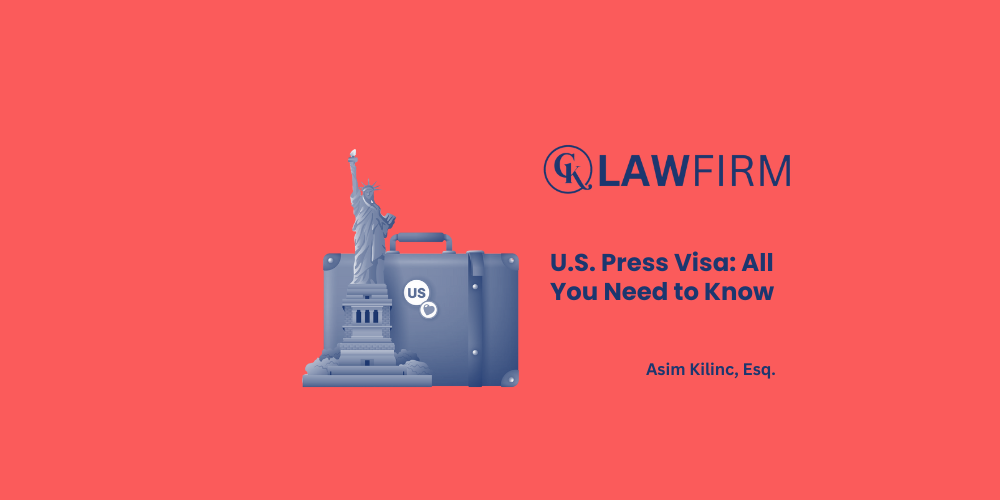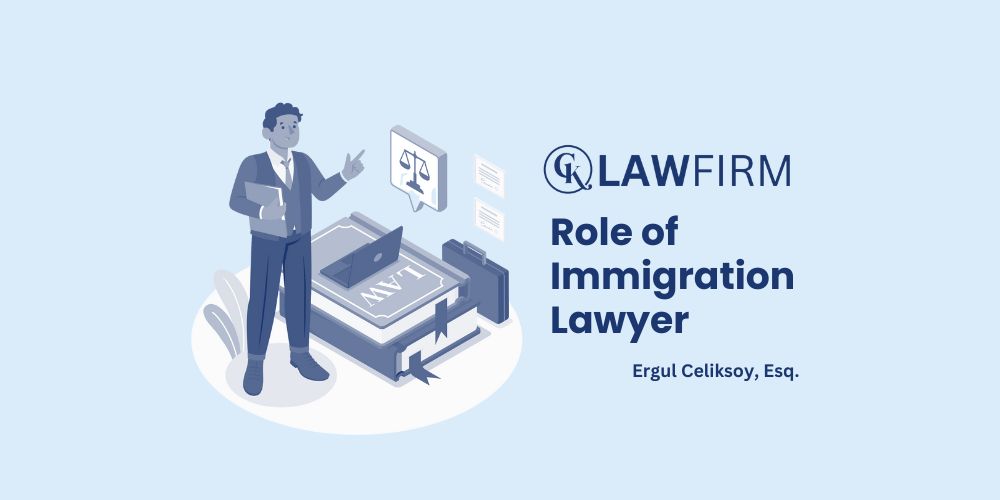Schedule an Appointment with Our Attorneys Now
By Ergul Celiksoy, Immigration Attorney at CK Law Firm
The E2 Visa is designed for entrepreneurs who wish to start a business or invest in an existing company within the United States. By meeting specific criteria, these investors and business owners can relocate their careers and lifestyles to the U.S. under the E2 program. Due to a bilateral treaty between the U.S. and various countries, including Türkiye, certain nationals are eligible to apply for an E2 Investor Visa. In this guide, we’ll explore the following topics with E2 visa application process:
- Overview of the E2 Visa
- Who Is Eligible to Apply for an E2 Visa?
- How Does the E2 Visa Application Process Work?
- What Rights Does the E2 Visa Offer in the United States?
- Is It Possible to Transition from an E2 Visa to a Green Card?
- Frequently Asked Questions
These highlights form our comprehensive look at the E2 Visa application process. If you have any additional questions related to the E2 Visa, feel free to reach out through our official website. For more personalized inquiries, you’re also welcome to connect with me on LinkedIn.

Overview of the E2 Visa
E2 is classified as a non-immigrant status, yet it grants you the opportunity to live in the United States for a set period and establish your own business. In other words, if you’ve always envisioned starting a new venture—or acquiring an existing one—in the U.S., the E2 Investor Visa can make that dream a reality. This visa allows you to invest in the American market, manage your enterprise, and even relocate with your family for a fresh start in the U.S.
Imagine opening a restaurant or purchasing a thriving business while seamlessly transitioning your life overseas. Sounds exciting, right? To turn that excitement into reality, it’s crucial to navigate your E2 Visa application carefully and ensure you meet all the eligibility requirements. Let’s explore whether you qualify for this opportunity.
Who Is Eligible to Apply for an E2 Visa?
Wondering “Who can apply for an E2 Visa?” The first step is determining whether your nationality is on the list of countries that hold a commercial treaty with the United States. Not all nationalities qualify for the E2 Visa, so verifying your eligibility is essential. To learn more about which citizens can apply, you can consult the official U.S. Department of State resources or our dedicated article on Can You Obtain U.S. Citizenship Through an E2 Visa?
However, merely having the correct citizenship isn’t enough. To submit a successful E2 Visa application, you’ll also need sufficient capital and a viable business model capable of generating revenue and employment opportunities. This could range from a local café to a tech startup, as long as your funds are invested in an “active” and “at-risk” venture, rather than a passive endeavor like real estate purchases for personal use.

How Does the E2 Visa Application Process Work?
The E2 Visa Application Process involves a series of steps that must be followed diligently. Below is an overview to guide you along your path:
- Preparation and Planning
- Decide which industry you intend to pursue.
- Determine how much capital you’re willing to invest.
- Develop a comprehensive business plan.
- Establishing or Acquiring a Business
- You may start a brand-new company or purchase an existing business.
- The key requirement is an active investment, meaning funds must be at risk and directed toward a functioning enterprise (passive investments in real estate, for example, do not qualify).
- Gathering Application Documents
- Prepare financial records, a valid passport, your business plan, company documentation, and all other relevant paperwork.
- Consulting with an E2 Visa attorney can streamline the application process, helping you submit a precise and well-organized file.
- Consular Processing
- After compiling all documentation, you submit your application to the appropriate U.S. Consulate or the USCIS (U.S. Citizenship and Immigration Services).
- You then schedule an E2 Investor Visa Interview, where you’ll discuss the authenticity of your investment and the potential benefits it brings to the U.S. economy.
- Outcome and Approval
- A successful E2 Visa application grants you the opportunity to embark on a new chapter in the United States.
- If your application is denied, you have the option to address the deficiencies and reapply, potentially improving your chances of approval on a subsequent attempt.
What Rights Does the E2 Visa Offer in the United States?
Now for the exciting part: what benefits do you gain once you enter the United States on an E2 Visa?
- Freedom to Manage Your Business: By investing in your own enterprise, you can actively oversee its operations and take full advantage of business opportunities across the U.S. market.
- Bring Your Family Along: Your spouse is eligible to apply for work authorization, and any unmarried children under the age of 21 can enroll in U.S. schools. It’s a chance for your family to explore a new culture and lifestyle together.
- Unlimited Entry and Exit: As long as your E2 Visa remains valid, you can travel to and from the United States whenever you need. This flexibility allows you to keep up with responsibilities in your home country while still managing your U.S.-based business.
Of course, retaining these privileges depends on keeping your investment active and proving that your business continues to operate productively. Remember, demonstrating your ongoing contribution to the U.S. economy is essential at every stage.

Is It Possible to Transition from an E2 Visa to a Green Card?
E2 is classified as a non-immigrant visa status, which means it does not automatically grant you a Green Card. Does that mean obtaining permanent residency is off the table? Not at all. Here are two alternative paths:
- EB-5 Investor Program: If you have the capacity to increase your capital to a higher threshold (typically USD 800,000 or USD 1,050,000, depending on the region) and meet specific job creation requirements, you may be eligible to apply for a Green Card through the EB-5 program.
- Other Visa Categories: Employer sponsorship (EB-2, EB-3, etc.) or family-based petitions can also offer long-term “permanent residence” solutions, depending on your qualifications and personal circumstances.
Each of these pathways has distinct prerequisites and procedures, so creating a well-informed strategy—often with professional guidance—can significantly simplify your journey.
Frequently Asked Questions
The duration generally depends on the treaty agreement between the United States and your home country. In many cases, it can be valid for up to five years. As long as your investment remains active, you can apply for extensions repeatedly.
If you hold an E2 Investor Visa, your spouse can apply for work authorization and your children can attend U.S. schools—often with reduced or no tuition costs if they enroll in public institutions.
Absolutely. You can correct the issues that led to the denial and submit a new application. It’s generally advised to seek professional guidance during your initial E2 Visa process to boost your chances of approval.
The E2 Visa only permits you to work for the business in which you’ve invested or have ownership. However, your spouse is free to work in any qualifying position once they secure the appropriate work authorization.
While there is no fixed minimum amount, your investment must be considered “substantial,” meaning it should be large enough to ensure the viability of the enterprise. Most applicants invest at least USD 100,000 or more, as this level of funding is commonly viewed more favorably.
The E2 Visa offers an exciting opportunity to turn your aspirations in the United States into reality. We’ve covered the key aspects in this E2 Visa application guide, but remember you’re always welcome to reach out through the CK Law official website for further assistance. If you’d like a more personalized discussion, feel free to connect with me on LinkedIn at any time.
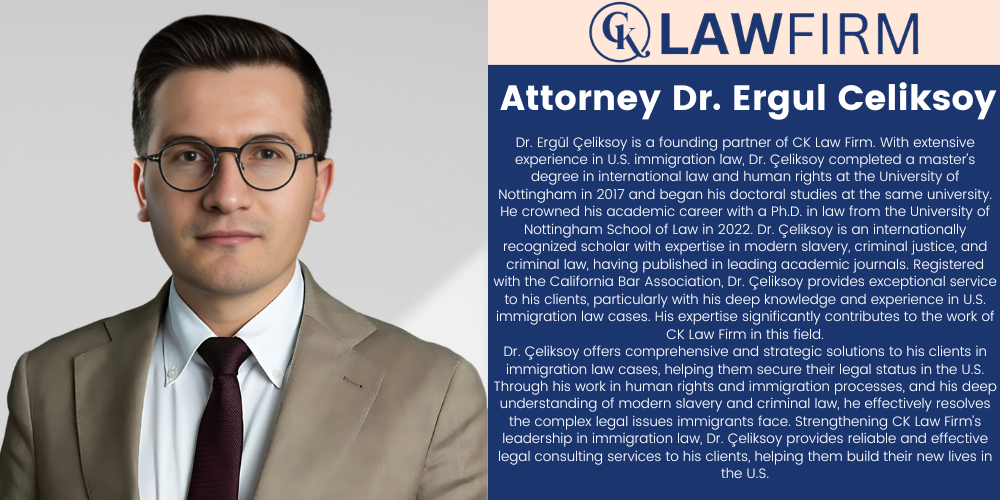
By Ergul Celiksoy, Immigration Attorney at CK Law Firm
For individuals with extraordinary abilities who wish to immigrate to the United States, the EB-1A visa is one of the most prestigious and direct routes. However, before applying for this visa, it’s essential to understand the processing time involved. In this article, I will answer some of the most common questions regarding the processing time of the EB-1A Extraordinary Ability visa. By reading this post, you’ll find answers to the following questions:
- What is the EB-1A Visa?
- Advantages of the EB-1A Visa
- EB-1A Visa Processing Time
- Factors Affecting EB-1A Processing Time
- Important Considerations During the EB-1A Application Process
If you have questions about other visa types like the EB-1A, feel free to reach out via the comments section at the bottom of this article, message me directly on LinkedIn, or contact me through our CK Law Firm Immigration Law website.
What is the EB-1A Visa?
The EB-1A is a U.S. immigrant visa designed for individuals with extraordinary abilities in science, arts, education, business, or athletics. Unlike many other visa categories, the EB-1A visa does not require a job offer or employer sponsorship. Instead, applicants must demonstrate and provide evidence of their exceptional achievements in their field. The EB-1A, also known as the “extraordinary ability” visa, is one of the fastest ways to obtain permanent residency (Green Card) in the United States.
Advantages of the EB-1A Visa
The EB-1A visa offers several benefits compared to other immigrant visas:
- No Job Offer Required: The EB-1A visa does not require a job offer, allowing you to apply independently without employer sponsorship.
- Direct Green Card: The EB-1A visa is one of the fastest routes to obtaining permanent residency in the United States.
- High Approval Rate: EB-1A applications have a high approval rate as long as you can prove your extraordinary abilities.
EB-1A Visa Processing Time
The processing time for the EB-1A visa begins once your application is submitted to USCIS. The process typically involves several stages:
- Preparation and Submission of the Application:
The EB-1A visa application requires careful preparation. Submitting all necessary documents accurately and completely can directly impact the review time. This stage of the application process, including gathering documents and preparing the file, can take between 2 to 4 months. - USCIS Processing Time:
After USCIS receives your application, it usually takes between 8 to 14 months to review and decide on the case. This time frame can vary depending on the complexity of the application, USCIS’s processing volume, and other factors. However, it is possible for this period to be extended, especially if a Request for Evidence (RFE) is issued, which can further delay processing. - Premium Processing Option:
If you want your EB-1A visa application to be processed faster, you can consider the Premium Processing option. For an additional fee, this service ensures that USCIS will review your application within 15 days. However, Premium Processing only speeds up the process and does not guarantee approval.
Factors Affecting EB-1A Processing Time
Several factors can influence the processing time for the EB-1A visa. These include:
- Application Complexity: If your application includes extensive documentation to prove your extraordinary abilities, USCIS may take longer to review it.
- USCIS Processing Volume: The volume of applications USCIS handles during a given period can affect processing times. Factors like pandemics, natural disasters, or other extraordinary events can lead to significant delays in processing times.
- Requests for Evidence (RFEs): USCIS may issue a Request for Evidence after reviewing your application, which can significantly delay the process. Responding promptly and thoroughly to RFEs is critical to expediting the process.
Important Considerations During the EB-1A Application Process
When applying for the EB-1A visa, there are some essential points to keep in mind:
- Prepare Your Application Completely:
Before starting the application process, ensure all necessary documents are ready. The EB-1A application requires a detailed preparation process, and careful management of this process can lead to faster processing of your application. - Pay Attention to Time Management:
The EB-1A application process can be time-consuming. Keeping track of the application process and considering acceleration options when necessary can help you manage the process more effectively. - Submit Strong Recommendation Letters:
When applying for the EB-1A visa, obtaining strong recommendation letters from recognized individuals in your field can increase your chances of success. These letters should emphasize your extraordinary abilities and contributions to your field. Strong and reputable references can make a significant difference in the USCIS review process.
Conclusion
The EB-1A visa is one of the most prestigious ways for individuals with extraordinary abilities to immigrate to the United States. Processing times can vary depending on the preparation of the application, USCIS’s processing volume, and other factors. However, it is possible to accelerate the process and increase your chances of success by taking the right steps.
If you wish, you can reach me via the CK Law Firm website at cklawfirm.org, by email at info@cklawfirm.org, or directly on LinkedIn to find out if you are eligible for the EB-1A visa through our free consultation service. All you need to do is send us your CV. We will review your CV and get back to you within 24 hours.
Who is Attorney Ergül Çeliksoy?
Attorney Dr. Ergül Çeliksoy is the co-founder of CK Law Firm and also serves as an Assistant Professor of Law at the University of Nottingham. With extensive experience in U.S. immigration law, Dr. Çeliksoy completed his master’s degree in international law and human rights at the University of Nottingham in 2017 before beginning his Ph.D. studies at the same university. Dr. Çeliksoy earned his Ph.D. in law at the University of Nottingham School of Law in 2022, marking a significant milestone in his academic career. He is a recognized academician with expertise in modern slavery, criminal justice, and criminal law, with publications in leading academic journals.
As a member of the California Bar, Dr. Çeliksoy provides outstanding service to his clients, particularly in U.S. immigration law cases. His knowledge and experience in immigration law are valuable assets to CK Law Firm’s practice in this field. Dr. Çeliksoy offers comprehensive and strategic solutions to his clients in immigration law cases, helping them secure their legal status in the U.S. His deep understanding of human rights and immigration processes, along with his expertise in modern slavery and criminal law, enables him to effectively address the complex legal issues faced by immigrants. By offering reliable and effective legal counseling services, Dr. Çeliksoy helps his clients build new lives in the U.S.
Asım Kılınç, Immigration Attorney, CK Law Firm
The H1B visa is a type of visa that allows foreign professionals to temporarily work and reside in the United States. Through this visa, many professionals gain the opportunity to work and grow in their respective fields on a global scale. However, it is crucial for professionals to make careful choices when selecting companies that sponsor H1B visas. In this article, you will find details addressing this point. Along with listing companies that sponsor H1B visas, I will also cover the following topics:
- What is the H-1B Visa?
- Who Can Apply for the H-1B Visa?
- H-1B Visa Occupations
- Companies That Sponsor H-1B Visas
- Transitioning from H-1B Visa to a Green Card
If you have any additional questions about the H-1B visa, feel free to reach out to us through the comments section of this blog or via the CK Law Firm Immigration Attorneys Website. For personal inquiries and consultation services, you can also contact me directly on LinkedIn.
What is the H-1B Visa?
The H-1B visa is a type of visa that allows foreign professionals to work in the United States in specialized fields. To qualify for this visa, individuals must possess expertise in areas such as technology, engineering, finance, academia, and medicine. Here are the key features of the H-1B visa:
- Validity Period: The H-1B visa is initially granted for a period of 3 years and can be extended up to a total of 6 years.
- Green Card Connection: The H-1B visa also provides a pathway to apply for a Green Card, granting permanent residency in the United States.
- Family Inclusion: One of the key advantages of this visa is the ability to bring your family members with you. This means you can embark on your professional journey in the U.S. while staying together with your loved ones.
Who Can Apply for the H-1B Visa?
I often hear the question, “Who is eligible for an H-1B visa?” To obtain an US H1B visa you must meet the criteria established by USCIS (U.S. Citizenship and Immigration Services). These criteria primarily include the following:
- Specialty Occupations: The H-1B visa is designed for individuals working in fields that require specialized expertise. Examples include software development, data science, medicine, and engineering.
- Educational Requirements: Applicants must hold at least a bachelor’s degree or possess equivalent professional experience in their field.
- U.S. Employer Sponsorship: To apply for an H-1B visa, you must have a job offer from a U.S.-based company willing to sponsor your application.
H-1B Visa Occupations
The H-1B visa primarily targets professionals working in science, technology, engineering, and mathematics (STEM) fields. However, it is not limited to these areas. Here are some common H-1B visa occupations:
- Software Developers and Data Scientists: The U.S. technology sector is one of the largest users of H-1B visas, making it a popular option for professionals in these fields.
- Engineers: Fields such as electrical, mechanical, and chemical engineering often see high demand for H-1B visa applicants.
- Academics and Researchers: This visa is also suitable for individuals specializing in academic fields like medicine and natural sciences.
- Finance Professionals: Roles such as financial analysts and risk managers are also eligible for H-1B visa applications.
These professions play a critical role in the economic and technological development of the United States, making them priority groups for the H-1B visa. Additionally, professionals applying from these fields often have a higher likelihood of their visa applications being approved.
Companies That Sponsor H-1B Visas
Firms that H1B visa sponsorship jobs are often among the leading companies in the United States. These organizations typically post job openings or extend job offers to qualified professionals. Companies that sponsor H-1B visas are commonly found in sectors like technology, finance, and engineering. Here are some of the major companies that sponsor H-1B visas:
- Technology Giants: Companies like Google, Microsoft, Amazon, and Apple lead the way in sponsoring H-1B visas. They offer job opportunities for experts in fields such as software development and data science.
- Financial Institutions: Firms such as JP Morgan and Goldman Sachs employ professionals specializing in finance and analytics.
- Engineering Companies: Organizations like Intel and Qualcomm seek experts in hardware development and related engineering disciplines.
H-1B Vizesi ile Green Card’a Geçiş
The H1B visa serves as a stepping stone for individuals seeking permanent residency in the United States. To apply for a Green Card through an H1B visa, the company sponsoring your H1B visa must also sponsor your Green Card process. Alternatively, H1B visa holders can apply for a Green Card under the EB-2 or EB-3 visa categories.
Another option provided by USCIS is obtaining permanent residency through the Labor Certification (PERM) process. However, this method may take a longer time to complete.
In this article, along with the information provided about companies that sponsor H1B visas, if you need support during your H1B visa process, you can always reach out to us through the CK Law Firm Website or via the comments section. Additionally, for specific inquiries or professional consultation, feel free to contact me directly on LinkedIn.
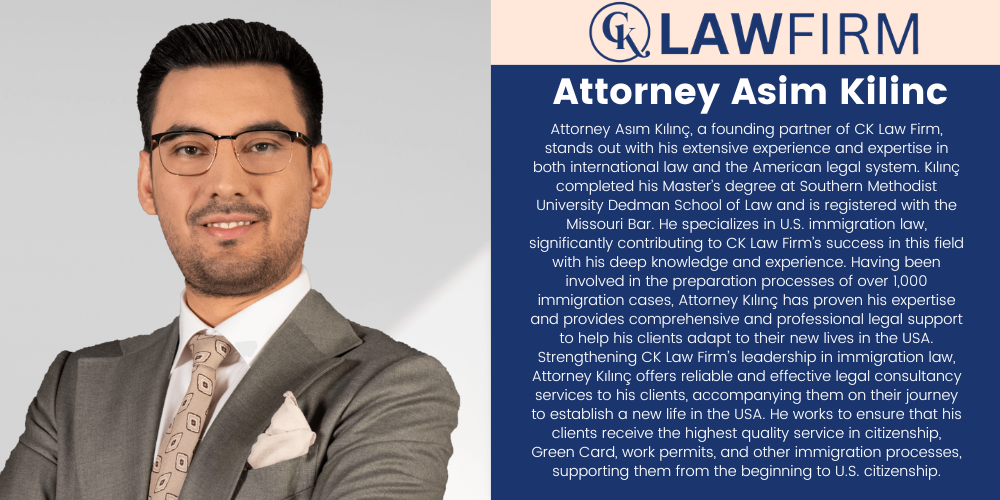
By Asim Kilinc, Immigration Attorney at CK Law Firm
For foreign nationals looking to engage in journalism, media, or other press activities in the United States, the U.S. Press Visa, or I Visa, is the ideal option. This visa is aimed at media professionals and journalists who meet specific requirements and need to conduct short-term press-related duties in the U.S. In this article, we’ll cover the application process, eligibility criteria, and other important details regarding the I Visa.
- What is the U.S. Press Visa?
- Who Can Apply for the U.S. Press Visa?
- What Are the Requirements for the U.S. Press Visa?
- U.S. Press Visa Application Process
- What Activities Can Be Conducted with the U.S. Press Visa?
- How Long Can I Stay in the U.S. with a Press Visa?
- Can I Apply for a Green Card with the U.S. Press Visa?
For additional questions, feel free to reach out through the comments section of this post, send me a message directly on LinkedIn, or contact me through the website of CK Law Firm, an Immigration Law firm I co-founded.
What is the U.S. Press Visa?
The U.S. Press Visa is a special visa issued to individuals traveling to the United States to perform press-related work temporarily. Journalists, filmmakers, reporters, photographers, and other media workers can apply for this visa. With this visa, you can work in the U.S. for a specified period while continuing your press activities.
Who Can Apply for the U.S. Press Visa?
The U.S. Press Visa (I Visa) is available to foreign media personnel engaging in temporary press and media activities in the United States. Those eligible to apply include:
- Journalists: Professional journalists who will gather news, conduct interviews, and report on events in the U.S.
- Filmmakers: Producers, directors, and camera operators involved in non-commercial documentary or film projects.
- Reporters: Reporters working for international media outlets, reporting news or events from the U.S.
- Photojournalists: Professional photographers taking photos for news outlets.
- Editors and Writers: Individuals writing or editing content for newspapers, magazines, TV, or radio outlets.
- Technical Staff: Technicians providing necessary support for media organizations and working temporarily in the U.S.
Applicants must be full-time employees of a media organization, working on a temporary assignment in the U.S. Freelancers or those involved in commercial projects may not qualify for the I Visa.
What Are the Requirements for the U.S. Press Visa?
Applicants for the U.S. Press Visa must meet specific criteria:
- Media Professional: You must provide proof that you are employed in the media industry. This can include official documents showing you work for a newspaper, TV channel, magazine, or other media organization.
- Temporary Assignment: You must state that you are in the U.S. temporarily for press-related duties. The U.S. Press Visa cannot be used for permanent jobs or to settle in the U.S.
- Press Activities: You must demonstrate that the activities you will be conducting in the U.S. are related to journalism or media, such as news gathering, reporting, or filming.
- Full-Time Employment: Freelancers are generally not eligible for this visa. You must be employed as a full-time worker for a media organization.
U.S. Press Visa Application Process
Filling Out the DS-160 Form:
Like other U.S. visas, applicants for the Press Visa must complete the DS-160 form online. This form is the foundation of your application and includes your personal information.
Payment of Application Fee:
A specific fee must be paid during the application process, which may vary depending on the consulate.
Supporting Documents:
You will need to provide supporting documents such as your media ID, a letter from your employer, and proof of your work.
Interview Appointment:
You will be required to attend an interview at the U.S. consulate. During the interview, you will need to explain the press-related activities you will be conducting in the U.S. and provide accurate documentation.
Visa Approval:
Once your application is approved, you will receive your U.S. Press Visa along with your passport. The visa’s duration will depend on the length of your assignment and any applicable agreements.
What Activities Can Be Conducted with the U.S. Press Visa?
With the U.S. Press Visa, you can engage in specific media and journalism activities in the U.S., including:
- News Gathering and Reporting: Journalists and reporters can gather and report news in the U.S.
- Documentary or Film Production: The Press Visa allows you to participate in the production of documentaries or films, provided they are not for commercial purposes.
- International Broadcasting: You can carry out work on behalf of foreign media organizations operating in the U.S.
How Long Can I Stay in the U.S. with a Press Visa?
The Press Visa is a temporary visa, and your stay in the U.S. is limited to the duration of your assignment. You are generally expected to leave the U.S. once your assignment is completed. However, in some cases, you may apply for an extension and renew the visa.
Can I Apply for a Green Card with the U.S. Press Visa?
The U.S. Press Visa is a temporary work visa and does not provide a direct path to a Green Card.
Frequently Asked Questions
- How long does the U.S. Press Visa application take?
The application process can take several weeks. However, this may vary depending on consulate processing times. - Can I bring my family to the U.S. with a Press Visa?
Yes, Press Visa holders can bring their spouse and children under 21 to the U.S. A separate application is required for family members. - Can freelance journalists apply for the U.S. Press Visa?
Generally, freelance journalists are not eligible for the U.S. Press Visa. However, if you work for a specific media organization, you may be eligible.
Conclusion
The U.S. Press Visa is an ideal option for foreign journalists and media professionals who need to work temporarily in the U.S. By ensuring you submit the correct documentation and follow the application steps carefully, you can expedite the approval process. At CK Law Firm, we guide you through the visa application process, helping you take the correct steps. For professional support and detailed consultation, reach out to us via cklawfirm.org, info@cklawfirm.org, or LinkedIn.
Who is Attorney Asım Kılınç?
Attorney Asım Kılınç is the co-founder of CK Law Firm and is recognized for his expertise in immigration law and U.S. asylum applications. Kılınç completed his Master’s degree at Southern Methodist University Dedman School of Law and is a member of the Missouri Bar Association, with a focus on U.S. immigration law.
Attorney Kılınç’s extensive knowledge and experience in immigration law have significantly contributed to CK Law Firm’s success in this field. He has actively participated in the preparation of over 1,000 cases, demonstrating his expertise in this area. By providing comprehensive and professional legal support to his clients, he helps them adapt to their new lives in the U.S.
Attorney Kılınç is also well-versed in U.S. asylum applications. He meticulously guides his clients through the process and ensures they receive the best legal advice. He provides top-quality service to clients in matters of citizenship, Green Card, work permits, and other immigration processes, supporting them from start to finish on their journey to U.S. citizenship.
Attorney Asım Kılınç, who solidifies CK Law Firm’s leadership in immigration law and U.S. asylum applications, offers reliable and effective legal consultancy services to clients, assisting them in building a new life in the U.S.
By Ergul Celiksoy, Immigration Attorney at CK Law Firm
The U.S. Citizenship and Immigration Services (USCIS) collects biometric data from individuals applying for visas, Green Cards, or citizenship for identity verification purposes. This data includes applicants’ fingerprints, photographs, and signatures. Biometric data is used for security checks and identity verification, ensuring that the application is securely and accurately processed. The biometrics appointment is one of the mandatory steps in the immigration application process, and without completing this appointment, your application cannot be processed. Attending this appointment on time is essential for a smooth application process. In this article, we will provide information about the biometrics appointment:
- Preparations for the Biometrics Appointment
- What Happens During the Biometrics Appointment?
- Post-Appointment Process
If you have any questions beyond these, please do not hesitate to contact me via the comments section below, send a message directly through LinkedIn, or reach out via the website of CK Law Firm, where I am a co-founder.
Preparations for the Biometrics Appointment
Preparing for the biometrics appointment is a critical step in the application process. The Appointment Notice (I-797C Form) sent by USCIS is an official document that contains all the details about your appointment. Carefully review this document and ensure you attend on the specified date. The basic documents you should bring to your appointment are:
- Appointment Notice: You must bring this letter from USCIS to your appointment, as it is a fundamental requirement for identity verification.
- Valid Identification: You should present a valid ID such as a passport, driver’s license, or an ID card issued by the U.S. government. USCIS will require this document to verify your identity.
- Additional Documents: In some cases, USCIS may request additional documents. These may vary depending on your application type or current status. For instance, if there is missing information in your application, you may be asked to provide extra documents to complete it.
It is very important to arrive on time. USCIS schedules appointments on a strict timeline, and delays can cause significant disruptions to your application. If you cannot attend the appointment, you must request a new appointment officially and as soon as possible.
What Happens During the Biometrics Appointment?
During the biometrics appointment, USCIS officers collect various biometric data from the applicant to complete identity verification. This process is generally quick, and the applicant is asked to perform a few basic tasks. The procedures during the biometrics appointment include:
- Fingerprinting: The applicant’s fingerprints from both hands are collected. Fingerprints are one of the most important biometric data used for identity verification and security checks.
- Photo: A passport-style photo of the applicant is taken and recorded in the USCIS system. This photo is used on identification documents and helps USCIS recognize the applicant during the application process.
- Signature: After collecting the biometric data, the applicant may be asked to provide a signature. The signature is added to the application file as part of the identity verification process.
Once these procedures are complete, the appointment ends, and the applicant can return to their daily activities. The appointment process usually takes about 15-30 minutes and aims to provide applicants with a comfortable experience.
For a professional impression, choosing appropriate clothing is recommended. Since USCIS will take your photo, it is advisable to wear clean and neat clothing. Additionally, avoid wearing accessories that cover your face (such as hats, large glasses, etc.) to ensure a proper photograph.
Post-Appointment Process
After the biometrics appointment is completed, USCIS continues to process your application. The collected biometric data is shared with security agencies like the FBI for background checks. During this stage, it will be investigated whether the applicant has a criminal record or poses any security risks. If no issues arise during the security checks, the application moves to the next stage.
If a problem is identified during the security checks, USCIS will inform the applicant and provide instructions on the necessary steps to address the issue. However, failing to attend the appointment or going without the required documents can result in the denial of your application or significant delays. Therefore, the biometrics appointment is crucial and should be carefully followed.
If you cannot attend your appointment, you can contact USCIS to request a new one. During this process, you must explain why you could not attend the appointment and schedule a new date. It is also important to follow the procedures set by USCIS when making a new appointment request.
Finally, the biometrics appointment is a critical step in your immigration application, and completing this process smoothly will positively impact your application’s approval. Preparing the necessary documents completely, attending the appointment on time, and adhering to USCIS officials’ requests are essential for the success of your application.
For professional support, detailed information, and consultation during your application process, feel free to contact us at cklawfirm.org, via email at info@cklawfirm.org, or through LinkedIn.
Who is Attorney Ergül Çeliksoy?
Attorney Dr. Ergül Çeliksoy is a founding partner of CK Law Firm and also serves as an Assistant Professor of Law at the University of Nottingham. With extensive experience in U.S. immigration law, Dr. Çeliksoy completed a Master’s degree in international law and human rights law at the University of Nottingham in 2017, followed by a Ph.D. at the same university. His Ph.D., completed in 2022 at the University of Nottingham School of Law, marked a significant milestone in his academic career. Dr. Çeliksoy has published extensively in leading academic journals and is internationally recognized for his expertise in modern slavery, criminal justice, and criminal law. As a member of the California Bar, Dr. Çeliksoy offers exceptional service to his clients, particularly in U.S. immigration law cases. His expertise and experience in immigration law significantly contribute to CK Law Firm’s work in this area.
Dr. Çeliksoy provides comprehensive and strategic solutions to his clients in immigration law cases, helping secure their legal status in the U.S. His work on human rights and immigration processes, particularly in modern slavery and criminal law, effectively addresses the complex legal issues immigrants face. Dr. Çeliksoy reinforces CK Law Firm’s leadership in immigration law by offering reliable and effective legal consulting services to his clients, helping them build new lives in the United States.
By Ergul Celiksoy, Immigration Attorney at CK Law Firm
Navigating the U.S. immigration system can be a daunting and complex journey. From filling out forms to attending interviews, the process involves numerous legal intricacies that can be overwhelming for individuals. This is where an immigration lawyer comes in. As an experienced immigration attorney, I have seen firsthand the significant benefits of legal assistance. This blog will explain the role of an immigration lawyer and highlight situations where seeking legal help is crucial.
Why Hire an Immigration Lawyer?
1. Expertise in Immigration Law
- Immigration laws are constantly evolving. An immigration lawyer stays updated on the latest changes and understands the nuances of the law, ensuring that your case is handled with the most current knowledge.
2. Personalized Legal Strategy
- Each immigration case is unique. An immigration lawyer can develop a personalized strategy tailored to your specific circumstances, increasing the likelihood of a successful outcome.
3. Avoiding Mistakes
- Errors in your application can lead to delays or denials. An immigration lawyer can help you avoid common mistakes by ensuring that all forms are correctly completed and all required documentation is submitted.
4. Advocacy and Representation
- An immigration lawyer can represent you in interactions with immigration authorities, advocating on your behalf during interviews, hearings, and appeals.
Situations Where Legal Assistance is Crucial
1. Complex Cases
- Example: Maria, a client from Venezuela, faced persecution in her home country. Her asylum application involved detailed documentation and personal statements. As her attorney, I helped gather evidence, prepared her for the interview, and represented her in court, ultimately leading to a successful outcome.
2. Denial of Previous Applications
- If your previous immigration application was denied, an immigration lawyer can help you understand the reasons for the denial and assist in filing an appeal or reapplying.
Example: Ahmed’s family-based green card application was denied due to incomplete information. We reviewed his case, gathered the missing documents, and successfully refiled his application.
3. Deportation or Removal Proceedings
- Facing deportation or removal from the U.S. is a serious situation that requires immediate legal assistance. An immigration lawyer can help you explore all possible defenses and represent you in immigration court.
Example: Fatima received a notice to appear for removal proceedings. We built a strong defense, demonstrating her eligibility for cancellation of removal, and she was allowed to remain in the U.S.
4. Employment-Based Immigration
- Employers and employees dealing with employment-based visas (such as H-1B, L-1, or EB-2) can benefit from legal assistance to navigate the complex requirements and ensure compliance with immigration laws.
Example: John, a skilled worker, received an H-1B visa through his employer. I assisted the company in preparing the necessary documentation and ensuring adherence to visa regulations.
5. Family-Based Immigration
- Reuniting families through immigration can involve various challenges. An immigration lawyer can help you understand the eligibility criteria and guide you through the process of sponsoring family members.
Example: Sara, a U.S. citizen, wanted to bring her parents to the U.S. We assisted her in filing the necessary petitions and provided ongoing support throughout the process.
6. Naturalization and Citizenship
- Applying for U.S. citizenship involves rigorous requirements and a thorough understanding of the process. An immigration lawyer can help you prepare for the naturalization interview and test, ensuring that you meet all criteria.
Example: David, a permanent resident, was nervous about the citizenship test. We provided study materials, conducted mock interviews, and ensured he was well-prepared, leading to his successful naturalization.
7. Special Immigration Programs
- Programs such as DACA (Deferred Action for Childhood Arrivals), TPS (Temporary Protected Status), and U visas for crime victims require specific eligibility and documentation. Legal assistance can help navigate these specialized programs.
Example: Maria, a DACA recipient, needed to renew her status. We ensured timely submission of her renewal application and provided ongoing support for her immigration needs.
Conclusion
Hiring an immigration lawyer can make a significant difference in the outcome of your case. From avoiding mistakes to receiving personalized legal advice, the benefits of legal assistance are invaluable. At CK Law Firm, we are dedicated to providing expert legal support tailored to your unique situation. Contact us today to discuss your immigration needs and explore how we can help you achieve your goals.
Subscribe to Our Newsletter
Subscribe to our newsletter to stay informed about the latest announcements and articles written by our attorneys on U.S. immigration processes.
Sobre Nosotros
Contáctanos
+1 (945) 527- 23 22
Correo electrónico
info@cklawfirm.org
Dirección
2800 Regal Rd #102, Plano, TX 75075

All Rights Reserved by CK Law Firm.


